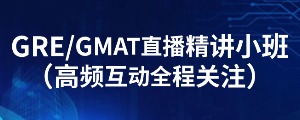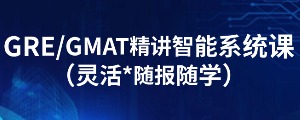选课中心
7099人选课
GMAT公开讲座
0元
GRE公开讲座
0元
一对一体验课
99元
GMAT模考网站
10000人
GRE模考网站
GMAT课程
GRE课程
托福辅导课程
【定制】1v1
私人订制
资料下载
考前冲刺

扫码添加助教
免费领取
备考资料大礼包

扫码关注公众号
新东方在线GMAT频道为大家带来GMAT阅读新题:Passage 6练习题一文,希望对大家GMAT备考有所帮助。更多精彩尽请关注新东方在线GMAT频道!>>点击查看更多GMAT阅读
Passage 6 (6/63)
In the eighteenth century, Japan’s feudal overlords, from the shogun (shogun: n.<日>幕府时代的将军) to the humblest samurai (samurai: n.(封建时代的)日本武士,日本陆军军官), found themselves under financial stress. In part, this stress can be attributed to the overlords’ failure to adjust to a rapidly expanding economy, but the stress was also due to factors beyond the overlords’ control. Concentration of the samurai in castle-towns had acted as a stimulus to trade. Commercial efficiency, in turn, had put temptations in the way of buyers. Since most samurai had been reduced to idleness by years of peace, encouraged to engage in scholarship and martial exercises or to perform administrative tasks that took little time, it is not surprising that their tastes and habits grew expensive. Overlords’ income, despite the increase in rice production among their tenant farmers, failed to keep pace with their expenses. Although shortfalls in overlords’ income resulted almost as much from laxity among their tax collectors (the nearly inevitable outcome of hereditary office-holding) as from their higher standards of living, a misfortune like a fire or flood, bringing an increase in expenses or a drop in revenue, could put a domain in debt to the city rice-brokers who handled its finances. Once in debt, neither the individual samurai nor the shogun himself found it easy to recover.
It was difficult for individual samurai overlords to increase their income because the amount of rice that farmers could be made to pay in taxes was not unlimited, and since the income of Japan’s central government consisted in part of taxes collected by the shogun from his huge domain, the government too was constrained. Therefore, the Tokugawa shoguns began to look to other sources for revenue. Cash profits from government-owned mines were already on the decline because the most easily worked deposits of silver and gold had been exhausted, although debasement of the coinage had compensated for the loss. Opening up new farmland was a possibility, but most of what was suitable had already been exploited and further reclamation was technically unfeasible. Direct taxation of the samurai themselves would be politically dangerous. This left the shoguns only commerce as a potential source of government income.
Most of the country’s wealth, or so it seemed, was finding its way into the hands of city merchants. It appeared reasonable that they should contribute part of that revenue to ease the shogun’s burden of financing the state. A means of obtaining such revenue was soon found by levying forced loans, known as goyo-kin; although these were not taxes in the strict sense, since they were irregular in timing and arbitrary in amount, they were high in yield. Unfortunately, they pushed up prices. Thus, regrettably, the Tokugawa shoguns’ search for solvency for the government made it increasingly difficult for individual Japanese who lived on fixed stipends to make ends meet.
1. The passage is most probably an excerpt from
(A) an economic history of Japan
(B) the memoirs of a samurai warrior
(C) a modern novel about eighteenth-century Japan
(D) an essay contrasting Japanese feudalism with its Western counterpart(A)
(E) an introduction to a collection of Japanese folktales
2. Which of the following financial situations is most analogous to the financial situation in which Japan’s Tokugawa shoguns found themselves in the eighteenth century?
(A) A small business borrows heavily to invest in new equipment, but is able to pay off its debt early when it is awarded a lucrative government contract.
(B) Fire destroys a small business, but insurance covers the cost of rebuilding.
(C) A small business is turned down for a loan at a local bank because the owners have no credit history.
(D) A small business has to struggle to meet operating expenses when its profits decrease.(D)
(E) A small business is able to cut back sharply on spending through greater commercial efficiency and thereby compensate for a loss of revenue.
3. Which of the following best describes the attitude of the author toward the samurai discussed in lines 11-16?
(A) Warmly approving
(B) Mildly sympathetic
(C) Bitterly disappointed
(D) Harshly disdainful(B)
(E) Profoundly shocked
4. According to the passage, the major reason for the financial problems experienced by Japan’s feudal overlords in the eighteenth century was that
(A) spending had outdistanced income
(B) trade had fallen off
(C) profits from mining had declined
(D) the coinage had been sharply debased(A)
(E) the samurai had concentrated in castle-towns
5. The passage implies that individual samurai did not find it easy to recover from debt for which of the following reasons?
(A) Agricultural production had increased.
(B) Taxes were irregular in timing and arbitrary in amount.
(C) The Japanese government had failed to adjust to the needs of a changing economy.
(D) The domains of samurai overlords were becoming smaller and poorer as government revenues increased.(E)
(E) There was a limit to the amount in taxes that farmers could be made to pay.
6. The passage suggests that, in eighteenth-century Japan, the office of tax collector
(A) was a source of personal profit to the officeholder
(B) was regarded with derision by many Japanese
(C) remained within families
(D) existed only in castle-towns(C)
(E) took up most of the officeholder’s time
7. Which of the following could best be substituted for the word “This” in line 47 without changing the meaning of the passage?
(A) The search of Japan’s Tokugawa shoguns for solvency
(B) The importance of commerce in feudal Japan
(C) The unfairness of the tax structure in eighteenth century Japan
(D) The difficulty of increasing government income by other means(D)
(E) The difficulty experienced by both individual samurai and the shogun himself in extricating themselves from debt
8. The passage implies that which of the following was the primary reason why the Tokugawa shoguns turned to city merchants for help in financing the state?
(A) A series of costly wars had depleted the national treasury.
(B) Most of the country’s wealth appeared to be in city merchants’ hands.
(C) Japan had suffered a series of economic reversals due to natural disasters such as floods.
(D) The merchants were already heavily indebted to the shoguns.(B)
(E) Further reclamation of land would not have been economically advantageous.
9. According to the passage, the actions of the Tokugawa shoguns in their search for solvency for the government were regrettable because those actions
(A) raised the cost of living by pushing up prices
(B) resulted in the exhaustion of the most easily worked deposits of silver and gold
(C) were far lower in yield than had originally been anticipated
(D) did not succeed in reducing government spending(A)
(E) acted as a deterrent to trade
以上就是新东方在线GMAT频道为你带来的GMAT阅读新题练习题,更多精彩敬请关注新东方在线GMAT频道。
| GMAT直播VIP小班 | GMAT直播精讲班 | GMAT录播课 |
| (VIP小班/全科班+1对1) | (全科精讲/单项备考) | (全科班/单项班) |
| 72.5课时 ¥18800 | 61课时 ¥7796 | 134课时 ¥14680 |

 资料下载
资料下载
新东方GMAT佛脚词汇1.0版本
发布时间:2023-06-30添加新东方美研助教号
回复【资料】获取
新东方GMAT数学500题资料下载
发布时间:2023-05-26添加新东方美研助教号
回复【资料】获取
新东方GMAT800题资料下载
发布时间:2022-05-21添加新东方美研助教号
回复【资料】获取
1000句GMAT真实句子改错问题
发布时间:2022-04-17添加新东方美研助教号
回复【资料】获取
2024杨鹏阅读难句(GMAT+GRE)教程
发布时间:2022-04-17添加新东方美研助教号
回复【资料】获取
新东方GMAT数学500题(解析及答案)
发布时间:2019-11-27添加新东方美研助教号
回复【资料】获取
新东方GMAT800题(逻辑+语法+阅读)
发布时间:2019-11-27添加新东方美研助教号
回复【资料】获取
新东方GMAT佛脚词汇1.0版本
发布时间:2019-11-27添加新东方美研助教号
回复【资料】获取
GMAT词汇/长难句/语法资料大全
发布时间:2019-11-27添加新东方美研助教号
回复【资料】获取
GMAT语文考试圣经(Bible)电子版
发布时间:2019-11-27关注新东方在线美研订阅号
回复【GMAT】获取
GMAT推理圣经PDF电子版
发布时间:2019-11-27添加新东方美研助教号
回复【资料】获取
GMAT考试OG五个版本题号对照表
发布时间:2019-11-27添加新东方美研助教号
回复【资料】获取
GMAT Ultimate Grammar电子书籍PDF
发布时间:2019-11-27添加新东方美研助教号
回复【资料】获取

添加美研助教号,
回复【GMAT】获取备考必看资料包

 推荐阅读
推荐阅读
新东方在线GMAT频道为大家带来GMAT阅读复习的五大步骤,希望对大家GMAT备考有所帮助。更多精彩尽请关注新东方在线GMAT频道! 1:原来
新东方在线GMAT频道为大家带来GMAT阅读背景的培养,希望对大家GMAT备考有所帮助。更多精彩尽请关注新东方在线GMAT频道! 一、经济学
新东方在线GMAT频道为大家带来GMAT阅读复习效率不高怎么办,希望对大家GMAT备考有所帮助。更多精彩尽请关注新东方在线GMAT频道! 建
新东方在线GMAT频道为大家带来GMAT阅读提高速度的根本方法,希望对大家GMAT备考有所帮助。更多精彩尽请关注新东方在线GMAT频道! 1
新东方在线GMAT频道为大家带来GMAT阅读如何避免错误,希望对大家GMAT备考有所帮助。更多精彩尽请关注新东方在线GMAT频道! 要避免GMA
新东方在线GMAT频道为大家带来GMAT阅读技巧的提升,希望对大家GMAT备考有所帮助。更多精彩尽请关注新东方在线GMAT频道! GMAT阅读推
新东方在线GMAT频道为大家带来GMAT阅读备考的注意事项,希望对大家GMAT备考有所帮助。更多精彩尽请关注新东方在线GMAT频道! GMAT阅
新东方在线GMAT频道为大家带来GMAT阅读怎么提高自己的能力,希望对大家GMAT备考有所帮助。更多精彩尽请关注新东方在线GMAT频道! 建
新东方在线GMAT频道为大家带来GMAT阅读长句子的备考,希望对大家GMAT备考有所帮助。更多精彩尽请关注新东方在线GMAT频道! 1 首先
新东方在线GMAT频道为大家带来GMAT阅读水平怎么提高,希望对大家GMAT备考有所帮助。更多精彩尽请关注新东方在线GMAT频道! 下面就来


 GRE/GMAT直播精讲小班
GRE/GMAT直播精讲小班
 GRE/GMAT精讲智能系统课
GRE/GMAT精讲智能系统课
 托福直播/精讲课(30天/60天)
托福直播/精讲课(30天/60天)
 资料下载
资料下载
添加新东方美研助教号
回复【资料】获取
添加新东方美研助教号
回复【资料】获取
添加新东方美研助教号
回复【资料】获取
添加新东方美研助教号
回复【资料】获取
添加新东方美研助教号
回复【资料】获取
添加新东方美研助教号
回复【资料】获取
添加新东方美研助教号
回复【资料】获取
添加新东方美研助教号
回复【资料】获取
添加新东方美研助教号
回复【资料】获取
关注新东方在线美研订阅号
回复【GMAT】获取
添加新东方美研助教号
回复【资料】获取
添加新东方美研助教号
回复【资料】获取
添加新东方美研助教号
回复【资料】获取

 阅读排行榜
阅读排行榜
 相关内容
相关内容